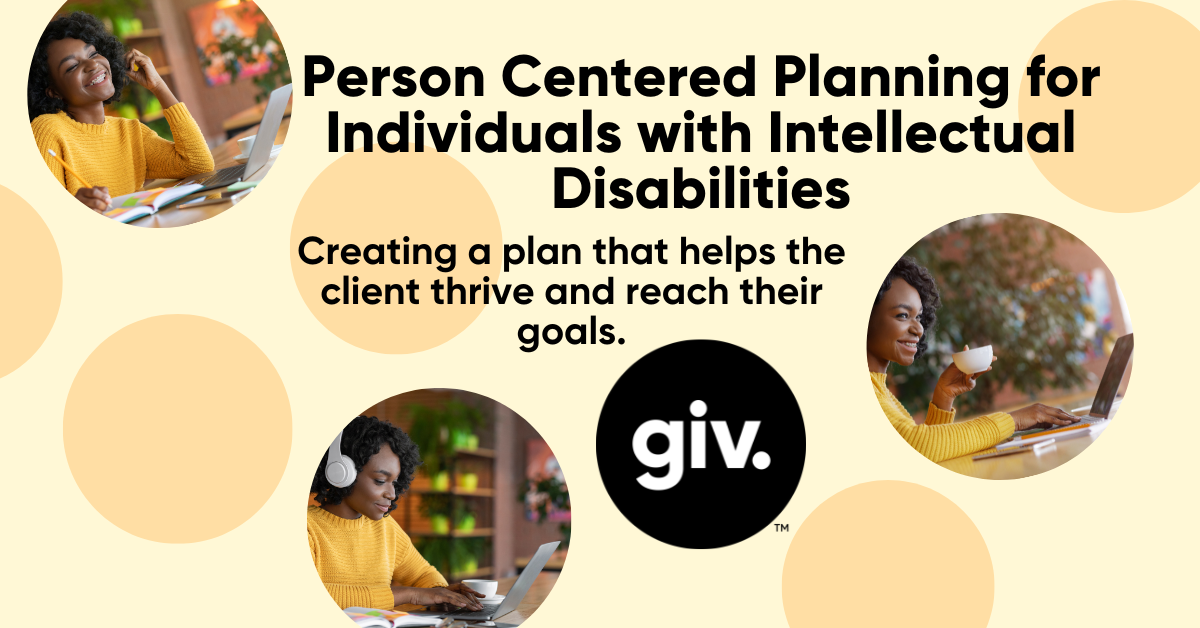In a world where every individual deserves to live a life filled with purpose and dignity, “person centered planning for individuals with intellectual disabilities” stands as a guiding light. At giv.care, we recognize the profound importance of tailoring care to the unique needs and aspirations of each person. Person-centered planning for individuals with intellectual disabilities is not just a methodology – it’s a commitment to fostering empowerment, independence, and a fulfilling life journey.
Understanding Person-Centered Planning
Person-centered planning for individuals with intellectual disabilities places the individual squarely at the center of their own care and support. It shifts the focus from a one-size-fits-all approach to a deeply personalized strategy that respects the individual’s preferences, strengths, and aspirations. By acknowledging the distinct challenges and opportunities faced by those with intellectual disabilities, giv.care ensures that each person’s voice is heard, and their choices are valued.

Key Principles of Person-Centered Planning
At the heart of person-centered planning for individuals with intellectual disabilities lie several key principles that guide the process. Firstly, it emphasizes active participation, ensuring that the individual and their support network collaboratively contribute to decision-making. This inclusive approach fosters a sense of ownership and empowerment.
Secondly, person-centered planning recognizes the importance of flexibility. The needs and aspirations of individuals with intellectual disabilities can evolve over time, and the plan should be adaptable to accommodate these changes. This flexibility is not only about adjusting strategies but also about nurturing a culture of empathy and responsiveness.
Implementing Person-Centered Approaches
Implementing person-centered planning for individuals with intellectual disabilities requires a multidisciplinary approach. It involves close collaboration among family members, caregivers, professionals, and the individual themselves. Giv.care facilitates an environment where open communication and active listening are paramount, enabling everyone involved to gain a comprehensive understanding of the individual’s unique needs.
Additionally, the implementation involves creating a comprehensive profile of the individual – their interests, abilities, communication preferences, and goals. This profile serves as the foundation for crafting a tailored care plan that supports their physical, emotional, and social well-being. Through regular assessments and feedback loops, giv.care ensures that the plan remains aligned with the individual’s evolving needs and aspirations.

Benefits and Outcomes of Person-Centered Planning
The benefits of person-centered planning for individuals with intellectual disabilities extend far beyond the realm of care. It fosters a sense of agency, self-esteem, and belonging, promoting greater independence and overall quality of life. When individuals have the opportunity to actively shape their own path, they are more likely to engage with their community, pursue meaningful activities, and develop essential life skills.
Moreover, person-centered planning can lead to more efficient and effective care. By focusing on what truly matters to the individual, resources are allocated where they are most impactful, avoiding unnecessary interventions. This approach also minimizes the risk of frustration and communication breakdowns, as caregivers and support providers are attuned to the individual’s preferences and needs.
Innovative Strategies for Person-Centered Planning
Person-centered planning is a dynamic process that continues to evolve. In recent years, technology has played a pivotal role in enhancing the implementation of person-centered approaches for individuals with intellectual disabilities. Tools such as digital platforms and mobile applications have enabled real-time communication between caregivers, families, and individuals, facilitating seamless updates to care plans and ensuring everyone remains on the same page.
Furthermore, the integration of assistive technologies has expanded opportunities for individuals with intellectual disabilities to actively participate in decision-making and daily activities. From communication aids to sensory stimulation devices, these innovations enhance engagement, communication, and overall well-being.

Overcoming Challenges and Ensuring Long-Term Success
While person-centered planning holds immense promise, it is not without challenges. One of the key obstacles is ensuring consistent and effective collaboration among all stakeholders. Clear communication channels, regular meetings, and continuous training are essential to overcome these challenges and ensure the success of person-centered planning initiatives.
Additionally, giv.care recognizes the importance of cultivating a culture of empathy and understanding within the caregiving community. This involves providing ongoing education and awareness about intellectual disabilities, fostering a supportive environment where individuals with disabilities are embraced and celebrated.
Conclusion
Person-centered planning for individuals with intellectual disabilities transcends traditional care models. It represents a profound shift towards inclusivity, empowerment, and dignity. At giv.care, we are committed to championing this approach, ensuring that each person’s unique journey is respected, celebrated, and supported. Through understanding, collaboration, and innovation, we pave the way for a brighter and more inclusive future, where individuals with intellectual disabilities can thrive and lead lives filled with purpose and joy. Person-centered planning isn’t just a strategy – it’s a promise to honor the uniqueness of every individual we have the privilege to serve.






